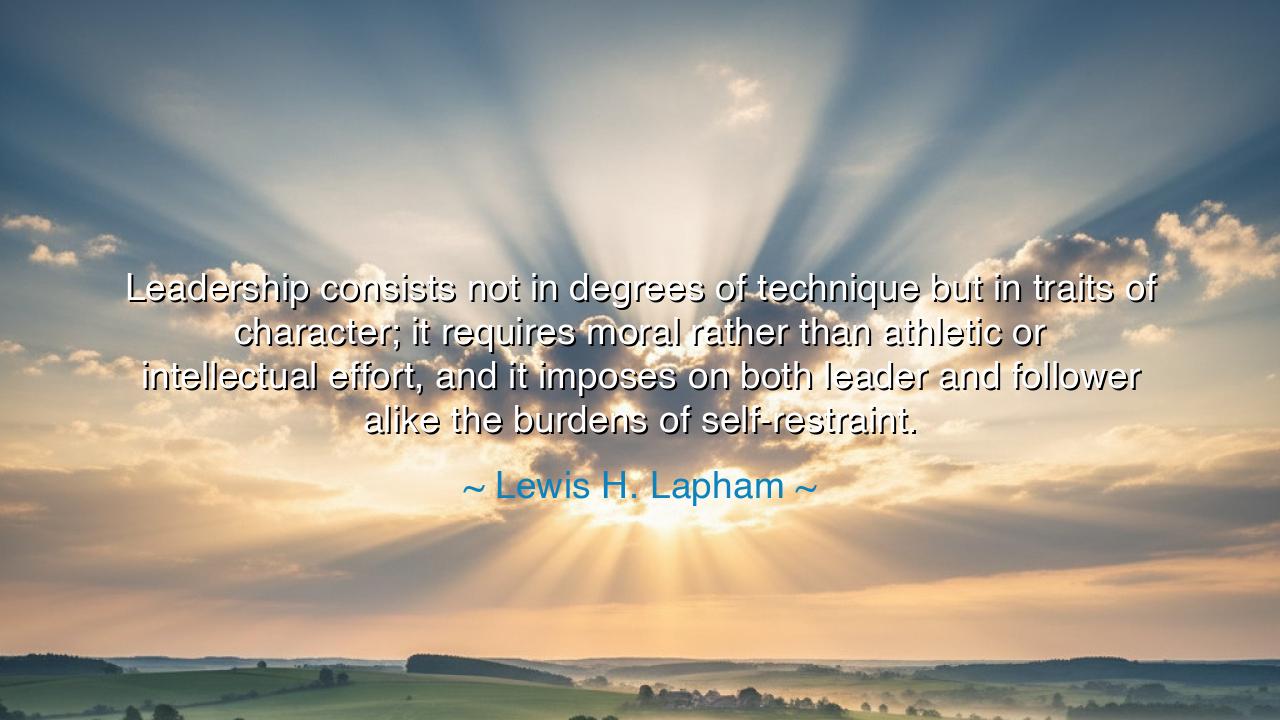
Leadership consists not in degrees of technique but in traits of
Leadership consists not in degrees of technique but in traits of character; it requires moral rather than athletic or intellectual effort, and it imposes on both leader and follower alike the burdens of self-restraint.






Hear, O children of reflection, the words of Lewis H. Lapham, who looked deep into the nature of authority and declared: “Leadership consists not in degrees of technique but in traits of character; it requires moral rather than athletic or intellectual effort, and it imposes on both leader and follower alike the burdens of self-restraint.” This is wisdom spoken not for the moment but for all ages, for it pierces through illusions of cleverness and reveals the eternal truth—that true leadership rests upon the moral fiber of the soul, not the sharpness of skill alone.
What is meant by “not in degrees of technique”? It is a warning against those who believe that leadership can be reduced to formulas, strategies, or polished performances. Technique can be learned, memorized, and displayed with ease. But technique without character is a mask that soon falls away. A cunning tongue or a strong arm may win momentary power, but only character secures trust that endures. For in the long arc of time, people do not follow the clever—they follow the trustworthy.
Thus Lapham turns our gaze to traits of character: honesty, humility, courage, compassion, patience, and integrity. These are the pillars of true leadership. A leader may lack brilliance in intellect or mastery in sport, but if his heart is steadfast, his people will walk with him. Conversely, a man may dazzle with wit or strength, yet if his character is corrupt, his followers will one day abandon him, and his name will be forgotten in shame.
And why does leadership require moral effort? Because it is not easy to do what is right when the world urges the easier path of compromise, corruption, or cruelty. It is not the muscles of the body nor the brilliance of the mind that bear this burden, but the conscience, which must be trained to resist temptation and endure hardship. To lead is to carry the weight of others’ trust, and to act not for oneself alone, but for the good of all. Such a calling demands a strength far greater than physical or intellectual might—it demands moral courage.
Consider the story of George Washington. Offered kingship after victory, he refused it, for he knew that liberty would die if he seized power for himself. His choice was not one of technique or strategy, but of self-restraint. By denying his own ambition, he gave birth to a republic that endured beyond him. The world remembers him not for clever maneuvers alone, but for the purity of his character, for in restraint he showed greatness.
Or think of Marcus Aurelius, emperor of Rome, who wielded immense power yet governed himself with discipline, humility, and wisdom. In his Meditations, he wrote not of conquest or technique, but of inner mastery, reminding himself to remain just, patient, and restrained even in the face of immense authority. His reign became one of Rome’s most revered, because he understood that leadership without self-restraint becomes tyranny.
The meaning of Lapham’s words, then, is this: leadership is not about dazzling displays of skill or the force of personality, but about character that inspires trust, moral effort that sustains justice, and self-restraint that prevents corruption. Leadership is as much a burden upon followers as upon the leader, for both must restrain their impulses, bear with one another, and commit to the higher good. Without restraint, society collapses into chaos; with it, order and trust flourish.
Therefore, O listeners, take this as your lesson: cultivate your character above all else. Do not rely merely on skill, for skill without virtue is hollow. Practice self-restraint in your words, your actions, and your desires, for in restraint lies true freedom. And when you are called to lead, remember that the essence of your leadership will not be measured by what you achieve for yourself, but by what you enable others to achieve through the strength of your example. For as Lapham has said, the true test of leadership is not in technique, but in the unshakable foundation of moral character.






AAdministratorAdministrator
Welcome, honored guests. Please leave a comment, we will respond soon